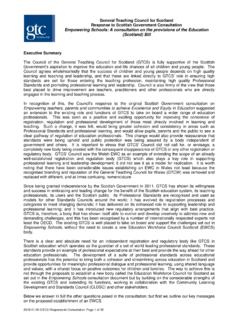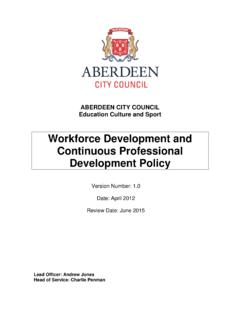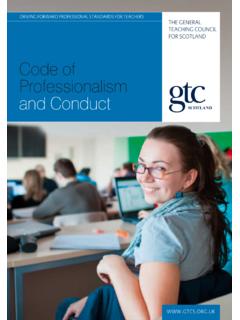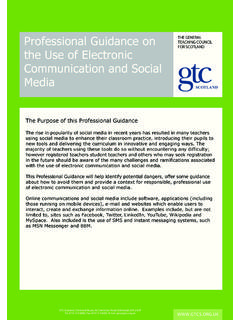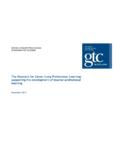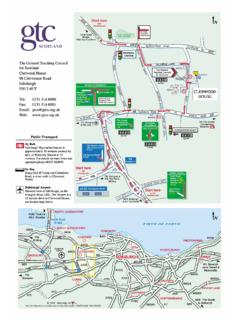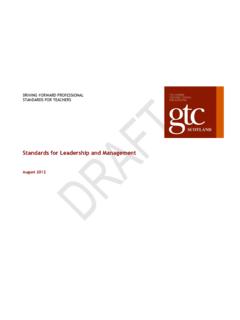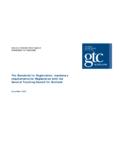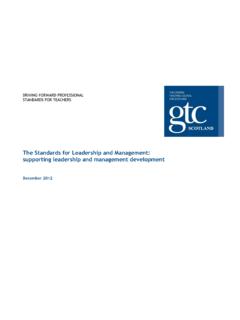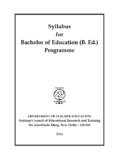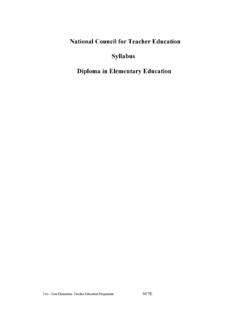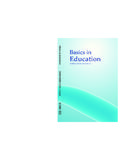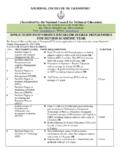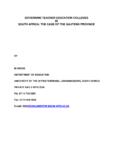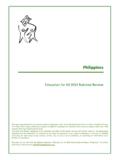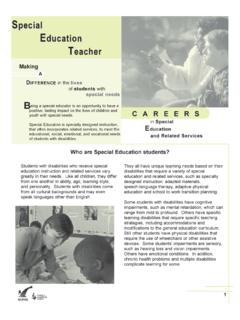Transcription of Memorandum on Entry Requirements to …
1 DRIVING FORWARD PROFESSIONAL STANDARDS FOR TEACHERS Memorandum on Entry Requirements to Programmes of initial teacher education in Scotland June 2013* *Including Religious education revisions - September 2015 *Including GCSE English and Mathematics grading update June 2016 Contents 1 Introduction .. 1 2 General Information on Qualifications .. 1 3 Registration with the General Teaching Council for Scotland (GTCS) .. 2 4 The Teaching Qualification (Primary education ).
2 3 5 The Teaching Qualification (Secondary education ).. 4 6 Secondary Subjects with Specific Requirements .. 6 Appendix A University Addresses and List of ITE Programmes Offered .. 11 Appendix B Useful Addresses .. 13 Appendix C SQA Qualifications in the Scottish Credit and Qualifications Framework .. 15 Appendix D Qualifications Accepted in Place of the English and Mathematics Requirements .. 18 Appendix E List of References .. 19 Memorandum on Entry Requirements to Programmes of ITE in Scotland - June 2013 1 1 Introduction Under the terms of the Public Services Reform (General Teaching Council for Scotland) Order 20111*, it is for the General Teaching Council for Scotland (GTCS) to determine what constitutes a recognised teaching qualification for individuals seeking registration with GTCS as a school teacher .
3 As part of this process, and after due consultation, the GTCS sets minimum Entry Requirements for the teacher education programmes in Scotland (provided by certain universities) that lead to a recognised teaching qualification. These are the minimum Entry Requirements . As long as an applicant meets the minimum Entry Requirements , it is for the universities to decide whether to accept or reject an applicant in line with their general admissions policy. Because some programmes are very popular, universities may require applicants to have more than the minimum Entry Requirements .
4 Universities also look for evidence that applicants have the necessary qualities for, and commitment to, teaching as a career. All enquiries about adequacy of qualifications should be directed to the universities. The names and addresses of the universities are listed in Appendix A on page 11. Application processes must meet all Equalities Legislation Requirements . This Memorandum relates to admission to teacher education programmes beginning in the academic year 2014 and beyond, until such time as a further edition of the Memorandum is published.
5 *A list of references is provided in Appendix E on page 19. 2 General Information on Qualifications There is no lower or upper age limit for applying for a place on a teacher education programme . All applicants must meet the minimum Requirements in this Memorandum before the programme starts. The qualifications needed for Entry to teacher education are set out in terms of the levels and credit value as defined in the Scottish Credit and Qualifications Framework (SCQF)2. The SCQF identifies qualifications with levels running from 1 to 12.
6 An Honours degree is rated at level 10 and a Higher National Diploma at level 8. A copy of the full SCQF framework is included in Appendix C on page 15. A National Qualification Course award in English at SCQF Level 6 (Higher Grade English or an accepted alternative), is an essential requirement for Entry to all teacher education programmes. A National Qualification Course award in Mathematics at SCQF Level 5 (National 5 Mathematics or an accepted alternative), is an essential minimum requirement for Entry to all teacher education programmes.
7 The qualifications that are accepted alternatives to these essential minimum Entry Requirements are in Appendix D on page 18. It is for the universities to decide the acceptability of individual qualifications. Any enquiries about the acceptability of qualifications should be directed to the universities. The names and addresses of the universities are listed in Appendix A on page 11. The system of selection of student teachers must take into account available reports on individual applicants, their experience and interests and the extent to which they match the personal characteristics desirable in a teacher .
8 2 Memorandum on Entry Requirements to Programmes of ITE in Scotland - June 2013 Applicants must have appropriate levels of literacy and numeracy and be competent in the use of Information and Communications Technology (ICT). They must have appropriate interpersonal skills and have the kind of personal qualities which will allow them to relate well to young people. They must show the characteristics of the attributes which will allow them to develop as teachers and ultimately as extended professionals.
9 They must have the capacity to develop professional values and to be reflective and innovative. They should show they have the capability to become experts in pedagogy and agents of change rather than recipients of it and to be autonomous while recognising their place within systems. In addition there is a need for commitment, resilience and high levels of self-efficacy. They should have the capacity to develop appropriate subject content and pedagogic content knowledge.
10 They should have the capacity to understand the principles of assessment and how assessment contributes to enhancing learning. They should show they are capable of being accountable and being able to consider the impact of their teaching on pupils and learners. They should have the capacity to know about research and scholarship and, where appropriate in the future, be actively able to practise research through, for example, professional enquiry. They should be committed to their own ongoing professional development and have some awareness of education s links to other fields.
